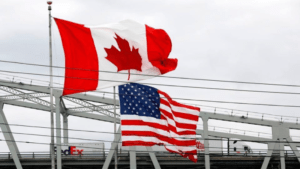
The latest World Economic Forum ranking of countries for travel and tourism puts Canada just outside the top 10.
The 2024 Travel and Tourism Development Index gives top spot to the United States, followed by Spain and Japan. Canada came in at number 11, receiving relatively low scores in the categories of tourism infrastructure, openness to travel and tourism, cultural resources and price competitiveness.
Destination Canada and the Tourism Industry Association of Canada recently stated that Canada was recently ranked 13th (in 2021), and that they aimed to get the country into the top seven by 2030. The tourism index report states Canada was number nine in 2019.
The index ranked countries around the world on a more than a dozen issues, including natural resources, business environment and safety/security. Scores range from 1 to 7, with 7 being best.
Here’s a look at how Canada and the U.S. compared in some key areas:
Openness to travel and tourism: USA 4.78, Canada 4.00
Air transportation infrastructure: USA 6.15, Canada 5.37
Tourism services infrastructure : USA 5.46, Canada 4.08
Price competitiveness: USA 2.59, Canada 3.19
Safety and security: USA 5.36, Canada 5.97
Natural Resources: USA 6.23, Canada 5.60
Cultural Resources: USA 5.06, Canada 2.89
Business Environment, USA 5.71, Canada 5.76
The issue of openness to travel and tourism is something mentioned by Canadian tourism officials in their recent report, which suggested Canada needs to “deepen Canadians’ pride in their home and love for hosting visitors” to improve the country’s tourism competitiveness.
“There are several areas where attention is needed in our tourism economy,” TIAC President and CEO Beth Potter said in an email to Open Jaw. Those include:
1. Investment in core infrastructure – including government owned infrastructure such as museum and other cultural institutions. It also includes creating an environment that is attractive to private investors.
2. Elevating the understanding of the tourism economy’s value to the overall economy is so important, if only to help those that make the financial decisions realize that that this industry provides a good return on investment, Potter said. For every dollar invested in our industry, we provide a return of $13, and 27% of visitor spending is returned to government (at all levels) via taxes.
3. If Canadians don’t value the tourism economy and the impact that it can have at the local level and to lives of all Canadians, then the industry will continue to struggle attracting great people to work in the industry, which leads to a lower level of customer service, and mars our national brand.
“These are all areas that TIAC and its members are working on; independently and in collaboration with our partners such as Destination Canada,” Potter said.
New Zealand fell from 20th spot in 2019 to 25th in this year’s WEF index, while Iceland fell from 22nd five years ago to 32nd this time around. Mexico dropped from 32nd in 2019 to 38th this year. Greece rose from 26th to 21st, while the United Arab Emirates jumped seven spots since 2019 and now ranks 18th in the world. Indonesia leapt from 36th in 2019 to 22nd in this year’s index.
Here are the top 25 countries in the world according to this year’s World Economic Forum travel and tourism index, with accompanying total score and 2019 ranking in parentheses.
1. USA, 5.24 (1)
2. Spain, 5.18 (2)
3. Japan, 5.09 (3)
4. France, 5.07 (6)
5. Australia 5.00 (7)
6. Germany, 5.00 (5)
7. United Kingdom, 4.96 (4)
8. China, 4.94 (9)
9. Italy, 4.90 (12)
10. Switzerland, 4.81 (8)
11. Canada, 4.81 (10)
12. Portugal, 4.78 ((13)
13. Singapore, 4.76 (11)
14. Korea, 4.74 (14)
15. Austria, 4.65 (15)
16. Netherlands, 4.64 (17)
17. Denmark, 4.63 (16)
18. United Arab Emirates, 4.62 (25)
19. Sweden, 4.57 (19)
20. Finland, 4.52 (18)
21. Greece, 4.52 (26)
22. Indonesia, 4.46 (36)
23. Belgium, 4.45 (23)
24. Ireland, 4.44 (21)
25. New Zealand, 4.41 (20)






